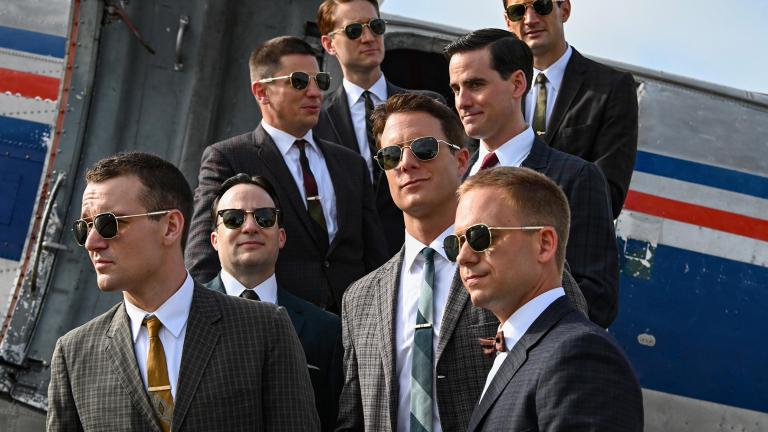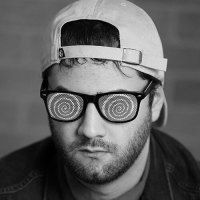The Right Stuff: What To Expect From The Disney+ Adaptation
A fresh take on Tom Wolfe's iconic novel from National Geographic is landing on Disney+ in October. We find out why The Right Stuff is returning for a new generation.

Actors can feel the crushing gravity of expectations when playing real-life figures, even if they’re playing astronauts. For the cast and creatives behind The Right Stuff, shooting the TV adaptation of Tom Wolfe’s iconic novel about the Mercury 7 and birth of NASA took on added historical significance during the summer of 2019, with July 20th marking the 50th anniversary of the Apollo 11 landing on the moon.
The series from National Geographic, which begins streaming on Disney+ on Oct. 9, shot at Universal Studios in Orlando, in close proximity to the Kennedy Space Center in Cape Canaveral. The day the crew filmed the first mission control scene, a NASA advisor sat in on a separate rehearsal with the director and the cast, pointing out which buttons to press and the correct terminology to use, going as far to help re-write lines in the script.
“It just made the whole thing feel so authentic,” says The Right Stuff co-producer Michael Hampton.
The actors playing the Mercury 7 astronauts—the group of military test pilots chosen to be part of the historic mission to put a man in space—had the opportunity to make a day trip to the Florida coast to participate in pilot training (without the actual flying part) during pre-production. They jumped into cockpits and spent time with specialists at Cape Canaveral. During that time shadowing real pilots, the actors who signed on to play larger-than-life American heroes were grounded and humbled by the experience.
“The biggest thing for me was seeing that massive, massive building where they built the rockets,” recalls actor James Lafferty, who plays astronaut Scott Carpenter. “There’s a majesty to it. It takes your breath away just seeing the size and the scope of it, just realizing how many people are in there at any given time, figuring out problems. The thing in that building goes to another planet. It goes into orbit, somewhere that we’ll never get to go.”
The pilot episode of the TV adaption of The Right Stuff sees the U.S. government task NASA to begin Project Mercury. Seven of the military’s best test pilots—Alan Shephard, John Glenn, Gordo Cooper, Scott Carpenter, Gus Grissom, Deke Slayton and Wally Schirra—are selected as part of the program and thrust into the public spotlight. At the crux of this adaptation is the rivalry between John Glenn (played by Patrick J. Adams) and Shepard (played by Jake McDorman) and their battle to be the first American in space (ultimately the Soviets did beat us there with Yuri Gagarin’s mission in 1961.)
Spending time at Cape Canaveral and inside the hectic mission control set transported the producers and actors to a time where it looked all but certain that the Soviet Union would beat the United States in a race to the stars. The pressure was mounting inside the government on the heels of the Soviets developing an atomic bomb in 1953 and launching Sputnik in 1957. In the original novel, Wolfe writes that House Speaker John McCormack, who led the committee on Astronautics, felt the country faced “national extinction” if it failed to catch up to the Soviet space program: “He was genuinely convinced that the Soviets would send up space platforms from which they could drop nuclear bombs at will, like rocks from a highway overpass.”
That sense of urgency is prevalent in the first hour of Nat Geo’s The Right Stuff. But it’s not all that defines this adaptation. During an era on TV and in film where remakes and reboots are boundless, there’s a G force of pressure for the producers and actors behind this adaptation of The Right Stuff to not only do justice to not only an iconic book, but also an iconic feature movie in its own right.
Philip Kaufman’s 1983 feature film adaptation stumbled at the box office but was a critical darling, earning eight Oscar nominations. Its legacy has only grown over the years—particularly among pilots, many of whom were directly inspired to fly because of it—and was preserved by the Library of Congress in 2013.
For the producers of the TV series, the appeal of revisiting The Right Stuff was being able to flesh out the character development of these larger-than-life figures that are so richly detailed in Wolfe’s book. Published in 1979, The Right Stuff won the National Book Award for Nonfiction in 1980. It humanized the Mercury 7 astronauts by demystifying the hero complex that surrounded them, while providing a tense and nervy account of being a test pilot—from life in the skies to the complexity of family life at home. It’s on a very short list of the greatest nonfiction works about the space program.
“We’re going back to the book and not remaking the movie,” Hampton says. “We are sticking to the true story pretty intact. It’s what we’ve always wanted to do, it’s what Nat Geo does better than anyone, and frankly you can’t make this stuff up.”
A show about smart men and women talking fast, intensely focused on science and technology that could change the future: Sound familiar? The producers found a perfect fit in showrunner Mark Lafferty, whose writing credits include period pieces and criminally underrated series Manhattan, about the creation of the atomic bomb, ‘80s and ‘90s computer boom drama Halt and Catch Fire, and another Nat Geo hit in Genius. Though Lafferty wasn’t available for interviews the day we were on set, the cast paraphrases his words about the media frenzy around the Mercury 7 crew being America’s “first reality show.”
“They were cowboys, but they also all of a sudden became the most famous people, almost on the planet,” says Colin O’Donoghue, who plays astronaut Gordon “Gordo” Cooper.
“There’s such a difference now surrounding celebrities than there was back then,” says Elosie Mumford, who plays Trudy Cooper, Gordo’s ex-wife. “Back then, there was the ability to have an actual private life. You’re dealing with people who don’t have perfect marriages, who don’t have the sort of all-American ideal that’s being presented; and where you see the cracks of that, and they’re desperately trying to hold onto their privacy as they become massively, massively famous.”
When Den of Geek visited the set in October, the significance of shooting during the 50th anniversary of the moon landing was a recurring point of pride for the cast. And with the Nat Geo production now moving to Disney+, they’re hopeful the The Right Stuff will land with a new generation, and it may be coming at the opportune time.
The retelling of the story of Mercury 7 takes on new resonance during a year in which SpaceX landed a reusable rocket in a giant leap towards Mars, reigniting interest in space exploration; a year where scientific innovation is essential to ending the COVID-19 pandemic and curbing climate change; and while the country faces an emotionally-charged political environment as it barrels toward an all-important election. The series won’t be a remedy for all our present ills, but it could serve as a reminder of what Americans can accomplish when they come together for a common goal.
“It harkens back to a time when America was a unified force, trying to get things done,” says Eric Ladin, who plays NASA official Chris Kraft Jr. “The pride that the country took in this space race is something that I think is really admirable. This was the last time that we had something bring us together as a country.”
Ladin, in researching the role, spoke to people who fondly recall the Mercury, Gemini, and Apollo missions and claim “they felt more proud to be an American that day than they ever had” when they saw the U.S. put men in space.
“One man I talked to, he was a veteran, he said, ‘I felt as proud to be an American that day as when I was on the beach in Normandy.’ And so I just think that it’s a really powerful thing that we were accomplishing then. And it didn’t matter who you were, what walk of life you were in, that was something you can get behind.”
